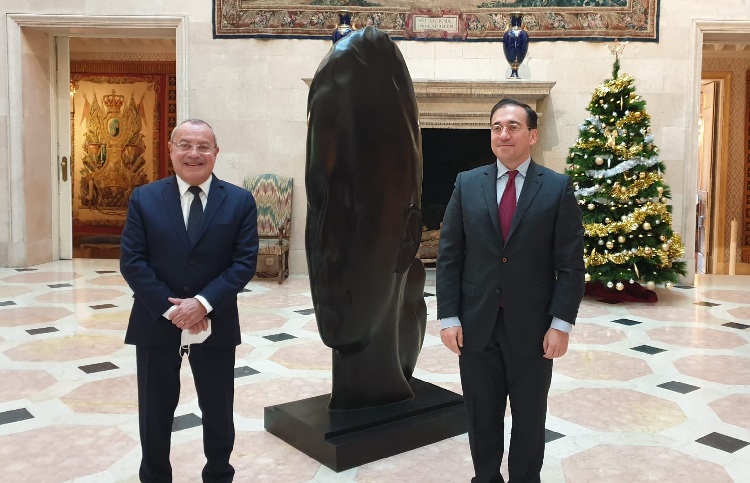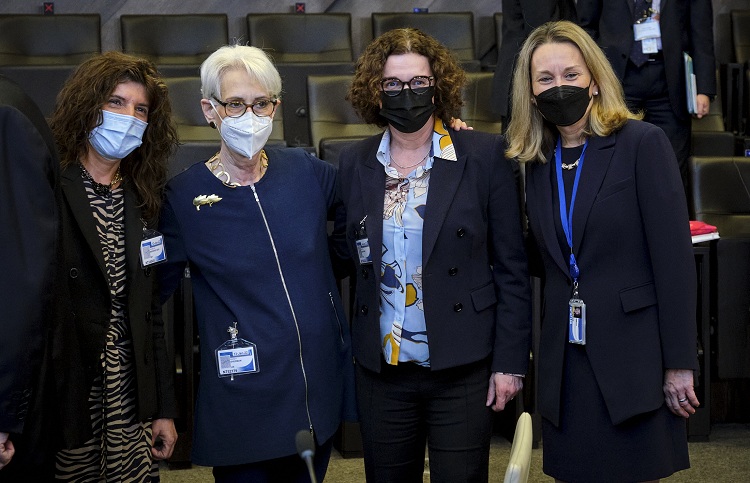The Diplomat
The Minister of Foreign Affairs, José Manuel Albares, yesterday conveyed to the French Ambassador in Madrid, Jean-Michel Casa, Spain’s support for the objectives of the French Presidency of the Council of the EU, “such as fair, green and digital economic recovery or the consolidation of the Migration and Asylum Pact”.
Albares participated yesterday in a breakfast offered by Jean-Michel Casa to the ambassadors of the EU Member States and representatives of the European institutions in Spain (specifically, the director of the Representation of the European Commission, Ángeles Benítez Salas) on the occasion of the beginning of the French Presidency of the European Union.
“Meeting with the EU ambassadors at the French Embassy in Spain on the occasion of the start of the French presidency of the EU,” Albares reported via his Twitter account. “Spain supports the French Presidency in objectives such as fair, green and digital economic recovery or the consolidation of the Migration and Asylum Pact,” he added.
For its part, the French Embassy stated, through the same social network, that this meeting – which was held at the French Ambassador’s Residence and in which Albares was accompanied by the State Secretary for the EU, Pascual Navarro, and other members of the Ministry’s EU working team – “marks the beginning of the French presidency of the European Union, in Madrid.”
The traditional flag-raising ceremony, which was to mark the start of the French Presidency of the Council of the European Union during the first half of 2022 and which was scheduled for this past Tuesday, was suspended as a sign of mourning due to the sudden death of the President of the European Parliament, David Sassoli. The event was to be attended by Pascual Navarro, Jean-Michel Casa, María Ángeles Benítez Salas, Robert Krmelj, Slovenian ambassador to Spain; and María Andrés, director of the European Parliament Office in Spain.
France assumed the Presidency of the EU on January 1. On this occasion, the French Embassy published in the first week of the year the general outlines of the six-month program of the French Presidency, which has been defined around “three ambitions”.
The first “ambition” is to move towards “a more sovereign Europe”, for which its objectives are to “strengthen the Schengen area” by protecting its borders, controlling migration and improving asylum policy “in line with its values and international commitments”; a “stronger Europe capable of acting in the field of security and defense”, support for prosperity and stability in its neighborhood, “in particular through its engagement with the Western Balkans and the reconstruction of its relationship with Africa”; and an improved European contribution to the response to global challenges.
The second major priority is to achieve “a new European growth model” that will make Europe “a major continent of production, job creation, innovation and technological excellence”. This objective must also reconcile economic development and climate ambition, support innovation and the growth of European digital players, and provide workers with quality, skilled and better-paid jobs.
The third ambition is “a humane Europe” that is capable of “listening to the concerns of its citizens in the framework of the Conference on the Future of Europe”, that defends the rule of law and is “faithful to its values” and that is “proud of its culture, confident in science and knowledge, determined to combat discrimination and committed to the future of its youth”.







